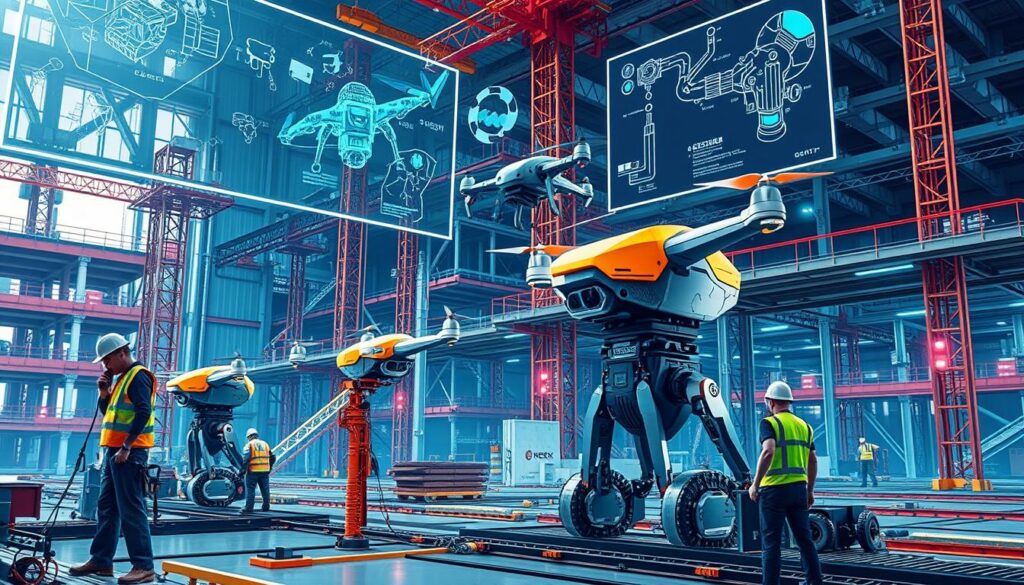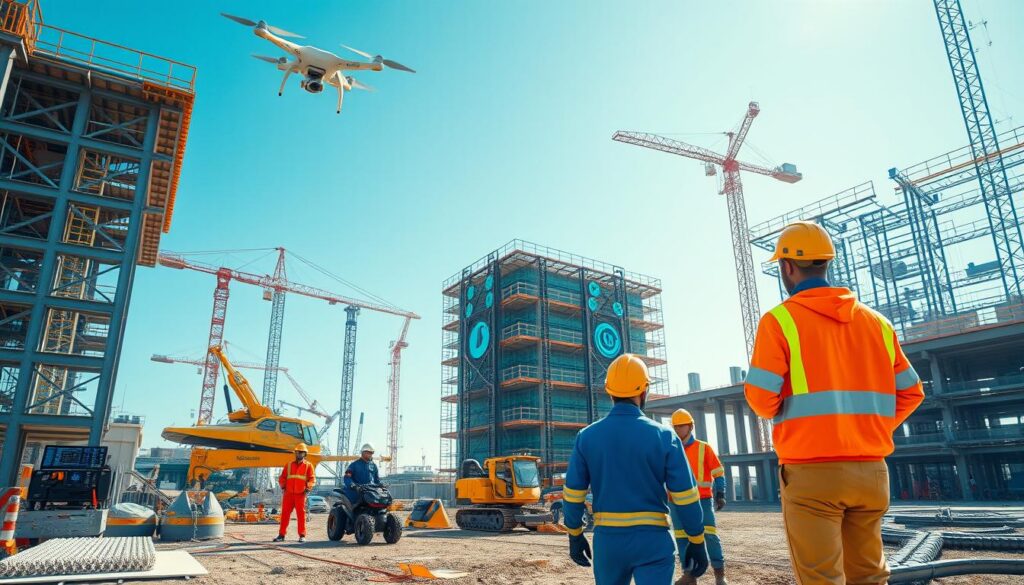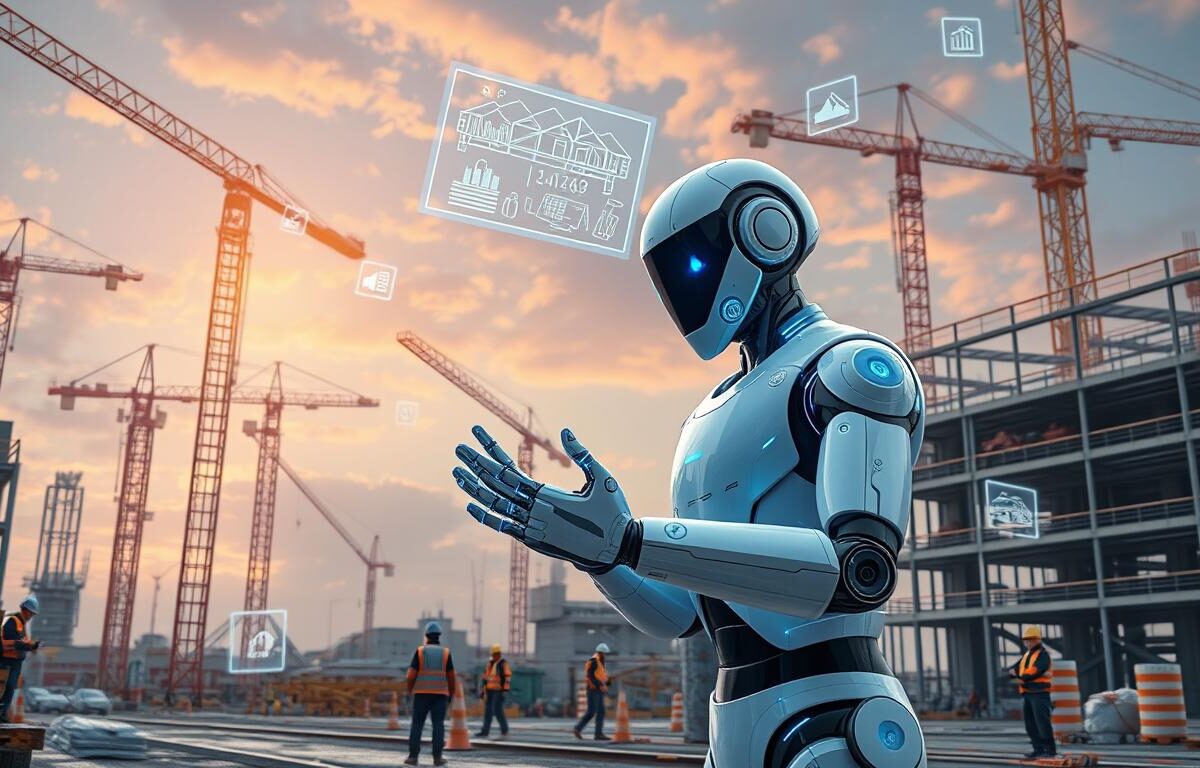The use of AI agents for the construction industry is changing how we handle projects. Now, planning, executing, and managing works have reached new heights. Thanks to smart construction solutions, the industry is overcoming old accuracy and efficiency issues.
These smart systems help in forecasting construction times and handling everyday tasks. They let construction pros focus on big decisions and safety standards. This leads to more productive and safer construction sites.
But, there are still hurdles like job security concerns and ensuring AI works well in tough spots. Nonetheless, the progress made shows clear gains like less waste and better planning. AI agents are shaping a more effective, safer, and greener construction scene.
Key Takeaways
- AI significantly improves project management and resource allocation
- Autonomous AI agents scale up efficiency and precision on-site
- AI adoption requires workforce training, technological upgrades, and a culture of innovation
- Predictive analytics and maintenance systems by AI agents boost operational reliability
- Real-time collaboration and skill enhancement highlight the partnership with AI agents
- AI-driven construction mitigates labor shortages and elevates quality control
- Challenges like data integration and cybersecurity are part of AI adoption in construction
Introduction: The Rise of AI in Construction
The construction world is changing fast, thanks to AI. New tech is making its way in, improving how buildings are made. This change leads to more sustainable and efficient construction processes. It also makes businesses run better.
Overview of AI Technology in Construction
Tools like machine learning and natural language processing are now key in construction. They support tools that make project planning and risk management better. AI helps in many ways, from predicting equipment failure to ensuring workers are safe.
Benefits of AI for Construction Professionals
Construction pros get big benefits from AI, like doing more work with fewer mistakes. AI helps predict the project’s path and uses resources wisely. This means fewer risks and better results. AI also helps in making smart choices, keeping projects at top quality.
| Feature | Impact on Construction |
|---|---|
| Predictive Analysis and Risk Mitigation | Reduces potential project delays and financial overruns |
| Resource Optimization | Enhances labor and material efficiency through automated scheduling and allocation |
| Real-time Safety Monitoring | Improves on-site safety with AI-powered sensors and cameras |
| Data-driven Decision Making | Supports project managers in making informed decisions by providing data-driven insights and scenario simulations |
| Regulatory Compliance and Quality Assurance | Automates compliance checks and ensures quality control throughout project lifecycle |
Key Features of AI Agents in Construction
AI has changed how we manage and run construction projects. Machine learning for construction companies and construction project management AI boost efficiency and accuracy. They bring new features and functions to the table.
Predictive Analytics for Project Management
Predictive analytics is a big deal in construction. It uses past data and machine learning to predict future project issues. Tools like Autodesk’s BIM 360 IQ use this data to foresee risks. This helps projects finish on time and within budget.
Automated Scheduling and Resource Allocation
AI improves scheduling and resource use in construction. It analyzes lots of data to make schedules better and manage resources well. This smart planning lowers downtime and boosts project productivity.

AI also makes resource management smarter. Programs like Compact Assist by Volvo Construction Equipment check on-site conditions. This ensures resources are used efficiently.
| Feature | Benefits | Example AI Tools |
|---|---|---|
| Predictive Analytics | Proactive risk management, time and budget efficiency | Autodesk BIM 360 IQ |
| Automated Scheduling | Optimal resource usage, reduced downtime | Compact Assist by Volvo |
| Resource Allocation | Improves operational efficiency, minimizes waste | AI in Digital Technologies |
The features of construction project management AI are changing construction. They improve project efficiency, cost control, and risk handling. This is a big leap forward, thanks to machine learning for construction companies.
Enhancing Project Efficiency with AI Agents
Artificial intelligence in construction is now a key tool transforming the industry. It improves project efficiency and operations. The use of AI makes automated construction processes more effective, impacting all project stages.
Streamlining Communication Among Teams
AI helps teams talk to each other better in the construction world. It makes handling information requests, scheduling, and paperwork easier. This cuts down the work involved in big projects.
Real-time Monitoring of Construction Sites
AI boosts site monitoring, offering updates and analysis on the go. This quick info helps teams make fast, informed choices. AI-driven tools use cameras and sensors for deeper site insights, making places safer to work.
Using Procore’s AI technologies in construction offers many benefits. For example, predictive analytics improve overall project management decisions.
| Feature | Benefits |
|---|---|
| Predictive Analytics | Improves risk assessment and project decision-making |
| Real-time Monitoring | Ensures continuous project tracking and immediate issue resolution |
| Automation & Robotics | Addresses labor shortages, enhances safety, and cuts down project timelines |
| Resource Management | Optimizes usage and allocation of materials and human resources |
| Financial Analysis | Boosts cost control measures and overall financial efficiency |
The growth potential for artificial intelligence in construction is huge. With AI and automated processes, the future of construction looks bright. It promises more efficiency and safer job sites, leading us into a new era of tech progress.
Safety and Risk Management Through AI
In the construction industry, AI is reshaping safety and risk management. It provides tools that predict hazards and improve training. By using construction industry automation and AI, we can detect risks early. This keeps both assets and lives safe.
Identifying Potential Hazards Before They Occur
AI improves risk assessments in construction. It allows us to take action before accidents happen. These systems look at lots of data to spot potential problems early. This helps avoid accidents and project delays.
AI video surveillance and image analysis keep a close eye on sites. They find safety issues and warn managers about dangers. This method follows safety rules well. It also makes the safety culture stronger on project sites.

AI-Driven Safety Training Solutions
Using AI for safety training provides specific tools for construction. Workers practice in simulations and virtual settings. They face real challenges safely. This training keeps workers engaged and prepares them for actual dangers.
AI in training means fewer accidents on site. Safety practices get stronger among workers. Adding AI to safety training makes construction sites safer.
AI improves safety protocols, making smarter decisions and using resources better. The AI in construction market is growing fast. It will jump from $496.4 million to $8.6 billion by 2031. The increase shows AI’s key role in future smart construction solutions. This move to tech-savvy, safe construction sites is big. It pushes industry leaders to use AI for better risk management and safety.
Case Studies: Successful Implementation of AI Agents
The digital world in construction is changing fast with AI tech. We see a story of new ideas and better ways to work. Through examples, we see clear benefits from using these tech tools.
Transformative Outcomes from Early Adopters
Companies like Bouygues Construction and Vinci Construction have led the way. They use AI to make projects run better and save materials. Bouygues improved projects with AI, while Vinci used AI in their engineering designs.
These steps help push the construction industry into the digital age. They make complicated tasks easier. This sets a high standard in construction tech.
Lessons Learned from AI Integration in Projects
Case studies show the big role of AI in fixing old problems. Issues like going over budget, safety, and using resources poorly. For instance, Eiffage used AI to keep machines running smoothly. This prevents breakdowns.
Hochtief changed the way we keep roads in good shape with AI. STRABAG used Microsoft’s tech to make building designs and sites more efficient. This shows AI’s growing impact in making construction better.
These examples tell us AI is crucial for improving how we build. It makes building safer and more eco-friendly. Learning from these pioneers helps us understand how AI can change the industry.
Future Trends: AI Agents Shaping the Construction Industry
Today, we’re stepping into a fresh chapter in construction, sparked by innovative tech. Artificial Intelligence, especially machine learning, is laying the groundwork for growth. AI technologies are transforming traditional building and project management on a big scale. They help manage complex data, make better decisions, improve safety, and smooth out operations from start to finish.
The Role of Machine Learning and Data Analytics
Machine learning leads this tech revolution, offering data insights and optimized plans for construction companies. Tools like Agent Studio offer code-free, customizable solutions for better resource and project planning. Also, platforms by Salesforce and Google allow more companies to use smart systems without needing deep programming skills. As these algorithms evolve, they’re making construction management more proactive and preventive.
Emerging AI Technologies to Watch
New AI technologies are becoming key players in construction. For example, Procore Insights helps firms manage risks smarter, leading to data-focused work environments. Pre-built AI agents also help with customer service and on-field support, making everyday tasks super efficient. AI advances towards apps that complete tasks fast, changing workflows and customer service.
But, there are hurdles like data quality, integration struggles, and cybersecurity threats. Still, the movement towards AI is clear. By 2027, half of all enterprises might use AI agents. Industries like healthcare and manufacturing are already seeing gains with AI, like predictive maintenance and spotting fraud. Construction companies should watch these trends closely. They need to be ready to use new AI agents that could change the game.
FAQ
How is AI transforming the construction industry?
AI is changing the construction industry by making project management easier. It improves accuracy and boosts efficiency on sites. By doing jobs like scheduling, AI lets workers focus on big decisions and safety, increasing productivity.
What benefits do construction professionals gain from using AI?
Construction professionals get more work done faster with AI. It helps with organizing work, keeping track of progress, and managing materials. AI tools also help make important decisions, work together better, and keep sites safe.
What are predictive analytics in AI for construction project management?
Predictive analytics use machine learning to guess project timelines, outcomes, and what’s needed. This gives managers insights to plan better and avoid problems earlier.
How do AI agents improve scheduling and resource allocation?
AI agents make scheduling and allocating resources easier by doing it automatically. They use data to make sure materials and workers are used the best way, making project management more accurate and efficient.
In what ways do AI agents streamline communication in construction?
AI helps communication by handling information requests and keeping schedules and submissions updated. This improves team work, lessens admin work, and helps make better decisions on sites.
How is real-time monitoring in construction enhanced by AI?
AI gives real-time updates on what’s happening on-site. This lets teams react quickly to any changes, keeping projects on track and safe.
How do AI agents contribute to safety and risk management in construction?
AI helps with safety and risk management by spotting hazards and bettering safety training. It checks workflows to find risks and develops tools for thorough safety training, cutting down accidents and pushing a safety-first approach.
Can you provide examples of successful AI implementations in construction?
A good AI example in construction is Procore Technologies. It uses AI to better project efficiency, help in decision-making, and streamline workflow. These AI tools automate routine tasks, improving operations and focusing on strategy.
What future AI trends should the construction industry watch for?
The construction industry should look for more machine learning and data analytics tools. Solutions like Agent Studio offer easy AI implementations. Innovations like Procore Insights will bring proactive risk strategies, aiming for smarter construction.
What role will machine learning and data analytics play in the future of construction?
Machine learning and data analytics will support smart construction, enabling predictive analytics, better efficiency, and smarter decisions. These technologies will evolve, transforming project management and industry standards.
What emerging AI technologies should construction companies be aware of?
Construction companies should watch for AI that offers smart predictions, automates planning, and provides new safety training. Tools that analyze lots of data for decision-making are key, leading digital advancement in construction.



